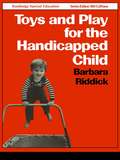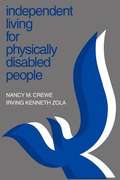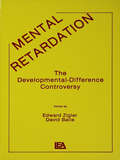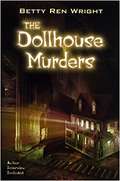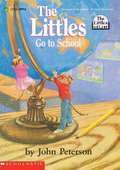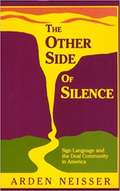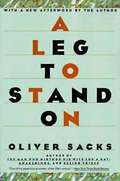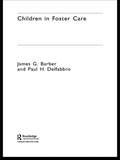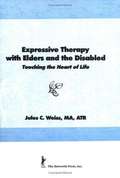- Table View
- List View
The Nature of Stuttering
by Charles G. Van RiperThis text organizes & summarizes a vast wealth of information concerning the nature of stuttering.
Toys and Play for the Handicapped Child
by Barbara RiddickFirst published in 1982. Routledge is an imprint of Taylor & Francis, an informa company.
An Uncommon Gift
by James S. EvansThe following quote is taken from the side flaps of the book: "Jamie Evans knows the meaning of fear, but it is not a posture he accepts himself. Like millions of Americans, he suffers from dyslexia and hyperkinesia. In this remarkable story of his struggle to combat these difficulties, he meets obstacle after obstacle and knocks them down, one by one. He reveals what is going on inside the person who cannot sit still, who is frustrated by an inability to read, who stutters, whose behavior is generally disruptive. The son of Dr. Louis H. Evans, Jr., and Colleen Townsend Evans, Jamie was born into a nurturing family who offered him love and provided excellent educational opportunities. Still, he had to fight a lonely battle. Beyond academic problems, Jamie experienced a lack of esteem and self-love. He was an angry, controlling person. In AN UNCOMMON GIFT Jamie relates how he conquered his learning disabilities. He shows that through counseling and supportive relationships deep emotional scars began to heal. From an individual who demanded constant attention emerged a caring person who recognizes the special needs of others. This is also a story of enduring faith. The author believes that God would not have given him problems without providing the resources to cope with them. He describes experiencing the power of Christ, who remained with him during a healing process that went on for years. Forthright, compelling, fascinating to read, this story of a young man's inner and outer struggles and ultimate victory carries a special message for all those who face life with handicaps to overcome, as well as for the families and friends who stand with them."
Emma and Co.
by Sheila HockenIn Emma and Co readers will be delighted to renew their acquaintance with Sheila Hocken, her family and, of course, her dogs. Since the miraculous operation which restored her sight Sheila in gratitude to Emma, her devoted guide-dog, companion and best friend, has grown into a love of all dogs--and in particular chocolate-coloured Labradors. Perhaps it is because in watching them grow up she can see for the first time how Emma herself must have looked as a young dog, dancing with excitement at the prospect of going out wearing her distinctive guide-dog harness. Now, as Emma enjoys her well- earned retirement, the other dogs take up more and more time for Sheila, her husband Don and their daughter Kerensa. There is Bracken, full of fun and mischief; Buttons, whose first litter of puppies gives problems but also great pride: one of them is accepted by the Guide-Dog Association to be trained as a guide-dog. There is Mocha, beautiful but absentminded; Teak, whom she buys for Don's birthday to make a change from aftershave and socks; and Shadow, with whom she develops a great interest in Obedience Trials. All of them appear here and will certainly endear themselves to the reader as they have already done to the Hocken family. Emma and Co is full of delightful (and sometimes disastrous) anecdotes, both human and animal. But there is great sorrow in it too, for in the end Sheila must learn to live without the dog who was her 'eyes' for many years.
If We Could Hear The Grass Grow
by Eleanor CraigFrom the book: "Each day I saw more clearly what I wanted. To have a day camp for troubled children. And spend one last summer with my children in this house. A final chance to reweave more smoothly the family ties that bound us." It was a summer that will touch your heart. Now, in the same honest, thoughtful style that made her previous book, P.S. Your Not Listening, so successful, Eleanor Craig, gifted family therapist, teacher, and author, tells the wonderfully moving true story of her experiences running a day camp for emotionally disturbed children at her Connecticut home. If We Could Hear the Grass Grow is a funny, sad, fascinating account of what it's really like to cope and communicate with severely antisocial children on a day-to-day basis, deal with their violence, help ease their pain, and free their astonishing often hidden-capacity for love and sharing. Eleanor Craig shows us how these seemingly unreachable children can be reached and, most important, can achieve remarkable growth when handled by a committed, sensitive teacher. Among her "special kids" are: Rodney, the "Big Man," older than his years, tough, uncontrollably aggressive, and as much in need of love as of discipline. Maria, sweet, undemanding, and troubled, one of a large Hispanic family where the father has a history of manic depression and of being physically abusive. She spends much of her time in fervent prayer. Frankie, overweight and immature, who acts out his mother's agoraphobia by refusing to leave her side, day or night. Adam, abandoned by his young, mentally ill mother, and unable to communicate except in comic book babble.
Independent Living for Physically Disabled People
by Irving Kenneth Zola Nancy M. CreweA text book for students in Rehabilitation Counseling classes.
Mental Retardation: The Developmental-difference Controversy
by Edward Zigler David BallaPublished in 1983, Mental Retardation is a valuable contribution to the field of Education.
Murphy's Boy: He Was a Frightened Boy Who Refused to Speak - Until a Teacher's Love Broke Through the Silence
by Torey L. HaydenHe sounded like a lost case right from the beginning. A fifteen year old boy who had not said a word since he was seven. And that wasn't the worst of it. When therapist Torey Hayden accepted this assignment others had long dismissed as futile, she knew she was in for a major challenge. But when she actually confronted Kevin, an institutionalized, retarded boy on the brink of manhood, who hid under tables, who feared highways and door hinges and spirals on notebooks and odd bits of string, who feared water too much to bathe and nakedness too much to change his clothes, she saw that bringing him back would take a miracle. And when the miracle happened, and Torey managed to penetrate Kevin's terrible silence, it was only to discover, lurking beneath a past littered with violence and mental cruelty, a dreadful secret, made all the worse by the bureaucracy that had recorded it, then filed it away.
Retarded Kids Need to Play: A Manual for Parents and Other Teachers
by Cyntha C. Hirst Elaine MichaelisThis book is written for the parents of retarded children, and for any other person who will be involved with teaching sport skills and physical education to the retarded. It presents a program of physical education activities which will help the retarded child develop those physical education skills necessary for enjoyable living.
Ten Fingers for God: The Complete Biography of Dr. Paul Brand
by Dorothy C. WilsonTen Fingers for God describes the extraordinary servanthood--the life of Dr. Paul Brand, a medical doctor, whose life and work have been a blessing to countless thousands of leprosy victims on five continents. Through surgeries (over 3,000 in India alone), the pioneering research he has conducted and inspired, and his empathy for the poor and forsaken. Dr. Brand has achieved fame in the medical world. Dr. Brand's professional life has centered on perhaps the most problematic aspect of creation, the existence of pain. His conviction that the function of pain in the human body is a disguised blessing to the human race. He felt that "God designed the human body so that it is able to survive because of pain. As a surgeon, teacher, and environmentalist. Dr. Brand 'has chosen the middle way of balancing the material and the mystical, the prophetic and the pragmatic. His spirit of self-sacrifice and humility can best be distilled by his sureness that "it is a pity that a man has only one life to spend, one pair of feet, two hands, ten fingers! Paul Brand is an adventure loving, highly spiritual surgeon who discovers his life's calling is to improve the hands and feet of people with leprosy worldwide. He developed techniques for returning functionality to disfigured, numb hands and feet and goes on to establish centers where patients receive protective shoes and learn skills to become employable. Paul both teaches others in many countries to help in his mission and learns from other doctors, scientists and rehabilitation specialists. In his travels and impassioned, informative speeches he raises awareness of this disease which is only contagious for a brief time and inspires people to pool their resources to improve care for a population ending their generations old fate of being shunned, ostracized and forced to beg for their survival.
The Dollhouse Murders
by Betty Ren WrightTwelve-year-old Amy knows there is some connection between Aunt Claire's old dollhouse in the attic and a deadly secret from years ago.<P><P> Winner of Pacific Northwest Library Association’s Young Reader’s Choice Award
The Littles Go to School
by John Peterson"I still don't see why I have to go," said Lucy. "But Lucy, it's fun," said Tom. "You get to see lots of the tiny kids from all over the Big Valley. We use the chalkboards. We read some of the textbooks the big kids use. There are maps and charts, and we live in dormitories in the walls of the classroom. You'll like it." Tom and Lucy are going to school! But an unexpected adventure in a gerbil cage gets them to school a little too early!
The Other Side of Silence: Sign Language and the Deaf Community in America
by Arden NeisserThe history of the struggle to legitimize sign language against the pressure of a hearing educational establishment intent on forcing upon the deaf the almost impossible task of learning lipreading and speech.
Understanding Low Vision
by Randall T. JoseTextbook on assessment of low vision, clinical services, training and instructional services, and special considerations.
Wheels for Walking
by Sandra RichmondAfter a car accident severs her spinal cord, eighteen-year-old Sally faces a long and painful adjustment to life as a quadriplegic.
A Diamond in the Darkness
by Veni RajThen one day Bahá'í teachers came to his village with a Great Message and things began to happen not only for the village but for Liaz as well. This true and inspiring story, generously illustrated by Tushar Kanti-Paul, will be enjoyed by children, youth and adults, as well.
A Leg to Stand On
by Oliver SacksDr. Oliver Sacks's books "Awakenings, An Anthropologist on Mars" and the bestselling "The Man Who Mistook His Wife For a Hat" have been acclaimed for their extraordinary compassion in the treatment of patients affected with profound disorders. In "A Leg to Stand On", it is Sacks himself who is the patient: an encounter with a bull on a desolate mountain in Norway has left him with a severely damaged leg. But what should be a routine recuperation is actually the beginning of a strange medical journey when he finds that his leg uncannily no longer feels part of his body. Sacks's brilliant description of his crisis and eventual recovery is not only an illuminating examination of the experience of patienthood and the inner nature of illness and health but also a fascinating exploration of the physical basis of identity. Copyright © Libri GmbH. All rights reserved.
Annie's Coming Out
by Rosemary Crossley Anne McdonaldA story which is a triumph for the human spirit and for the power of compassion Confined to an institution because of her physical disabilities since the age of three, Annie is hardly alive when Rosemary, an assistant to the hospital psychiatrist, discovers her. Together they battle against physical impediment, obdurate and uncaring bureaucracy and public apathy to find a new life for Annie outside--a life which has dignity, hope and love.
Braillables: A Manual for Parents and Teachers - Techniques for Teaching Drawing with Braille
by Marie PorterFrom the book: Braillables are pictures that are brailled by people who are able to braille them. They are outlines, sketches, sculptures, drawings, artwork. They are a creative expression that uses a necessary skill of blind people. They are fun to do, easily shared by sighted people, and they give an added dimension of freedom in using what can be a very rigid mode of communication. Blind people can draw in a medium over which they have complete control. Drawing with braille builds skill in reading, in interpreting charts, maps, diagrams, math and science figures. For those who pursue it, drawing with braille encourages imagination, creativity, a feeling for abstraction, perspective and proportion--all elements necessary for good concepts of objects, spatial relationships, and, ultimately, skill in orientation and mobility. Braille has an aura of mystery about it which isolates the reader. It can be austere, unpenetrable, a symbol of struggle and pain both for the blind person and for the family and friends. There is a coming together, a sharing, a breaking down of barriers when two heads bend over a picture of a dog and both the blind person and the sighted person see it as a dog. That is the fun of it.
Children in Foster Care
by Paul Delfabbro James Barber Robyn GilbertsonResearchers, practitioners, journalists and politicians increasingly recognise that foster care throughout the world is in a state of crisis. There are more and more children needing care and, as residential alternatives dry up, more of these children are being assigned to foster families. This book reports the major findings of a two-year longitudinal study of 235 such children who entered the foster care system in Southern Australia between 1998 and 1999. As well as examining the changing policy context of children's services, the book documents the psychosocial outcomes for these children, their feedback on their experiences of care, and the views of their social workers and carers. In the process, the book examines some cherished beliefs about foster care policy and sheds new light on them.The research reveals that while most children do quite well in foster care up to the two-year point, there is a worrying amount of placement instability at a time when the concentration of emotionally troubled children in care is increasing throughout the western world. Although, surprisingly, placement instability does not appear to produce psychosocial impairment for a period of up to eight months in care, it has an extreme effect on children who are moved from placement to placement because no carer will tolerate their behaviour. These children are consigned to a life of distribution and emotional upheaval because of the lack of alternative forms of care. Another unexpected finding of the research is that increasing the rate of parental contact achieves little or nothing in relation to the likelihood of family reunification.As child welfare increasingly enters a world of research-based practice, Children in Foster Care provides some much needed hard evidence of how foster care policy and practice can be improved.
Classroom Success for the Learning Disabled
by Suzanne H. StevensFrom The Book Jacket "Stevens has done it again! Her newest book on learning disabilities is lucid, accurate, insightful, practical, and it makes superb reading.... Her book provides the most helpful information I have seen for regular classroom teachers who are concerned with the realities and the nitty-gritties of helping LD children. My only regret is that the book has not been available for the last 20 years." DR. BARBARA BATEMAN University of Oregon "Stevens' book should be on the desk of every elementary and middle school teacher in every English-speaking country of the world. Stevens must have been an excellent classroom teacher, for she obviously understands both good elementary education and the learning-disabled child. Her book will go far to assist learning-disabled children toward a greater realization of their potentials." WILLIAM M. CRUICKSHANK, Ph.D. University of Michigan Between ten and twelve percent of the children in the U.S. are learning disabled. With such a large proportion of the population affected, the problem is not simply the concern of parents, LD individuals, and their teachers. It is the concern of society as a whole. In Classroom Success for the Learning Disabled, Suzanne Stevens discusses ways that we can help these children succeed in school and grow into productive adults. She offers practical suggestions on: Recognizing the LD child Adjusting teaching techniques Adapting texts and other materials Using LD specialists and psychologists effectively Adjusting classroom management procedures Testing and grading fairly Mainstreaming the LD child Stevens, a learning disabilities expert and a former classroom teacher, is the author of The Learning-Disabled Child: Ways That Parents Can Help. JOHN F. BLAIR, Publisher 1406 Plaza Drive Winston Salem, NC 27103 ISBN 0-89587-035-5 $8.95
Emma V.I.P
by Sheila HockenSequel to Emma and I. Sheila talks about her life after being able to see again, about learning and relearning to read print, about seeing snow for the first time, and about the other things, including the pitfalls and joys of regaining vision. She also talks about the birth of her daughter Kerensa, and of three additions to the family, of her dreams of owning a cattery and kennels, and of Don's and her fears that Kerensa may be blind. The story is interwoven with stories of Emma, in retirement, of the publication of Emma and I, and of the new pups in the family, Bracken and Buttons.
Expressive Therapy with Elders and the Disabled: Touching the Heart of Life
by Jules C. WeissA classic book on the use of expressive therapies with uncommunicative elders and the disabled. This poignant guide explores group and individual therapeutic activities that promote creativity, self-expression, communication, and understanding of one's life. An experienced art therapist relates his insights into the psychosocial dynamics of elders and the disabled and shares his awareness of the sensitivity and understanding required to reach the "unreachable. " Health care workers will find this illustrated volume rich in therapeutic techniques and processes applicable to the care and growth of psychologically and physically disabled or minimally handicapped adults and elders.
Goodbye Hamilton
by Catherine CooksonA continuation of Maisie's story, and she still feels the need for her imaginary horse Hamilton. Her deformed arm makes it hard for her to defend herself, and it seems that she is destined to have sorrow with a small amount of happiness.

